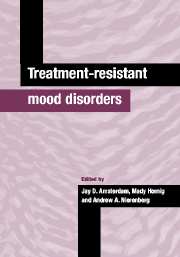Book contents
- Frontmatter
- Contents
- List of contributors
- Preface
- Part I The clinical problem
- Part II Biological basis
- Part III Treatment approaches
- 8 Selective serotonin reuptake inhibitors and serotonin–norepinephrine reuptake inhibitors in treatment-resistant depression
- 9 Conventional and second generation monoamine oxidase inhibitors in treatment-resistant depression
- 10 Drug combination strategies
- 11 Electroconvulsive therapy in medication-resistant depression
- 12 Thyroid augmentation
- 13 Cognitive therapy and psychosocial interventions in chronic and treatmentresistant mood disorders
- Part IV Special patient populations
- Part V Economic and ethical issues
- Index
- Plate Section
8 - Selective serotonin reuptake inhibitors and serotonin–norepinephrine reuptake inhibitors in treatment-resistant depression
from Part III - Treatment approaches
Published online by Cambridge University Press: 25 March 2010
- Frontmatter
- Contents
- List of contributors
- Preface
- Part I The clinical problem
- Part II Biological basis
- Part III Treatment approaches
- 8 Selective serotonin reuptake inhibitors and serotonin–norepinephrine reuptake inhibitors in treatment-resistant depression
- 9 Conventional and second generation monoamine oxidase inhibitors in treatment-resistant depression
- 10 Drug combination strategies
- 11 Electroconvulsive therapy in medication-resistant depression
- 12 Thyroid augmentation
- 13 Cognitive therapy and psychosocial interventions in chronic and treatmentresistant mood disorders
- Part IV Special patient populations
- Part V Economic and ethical issues
- Index
- Plate Section
Summary
Introduction
The selective serotonin reuptake inhibitors (SSRIs) represent one of the biggest advances in antidepressant pharmacotherapy in recent years, arguably the most important development since the accidental discovery of the antidepressant activity of a chlorpromazine analogue called imipramine. However the SSRIs’ advantages lie primarily in an improved side effect profile and greatly improved safety in overdose; not efficacy. A newer class of antidepressants, the selective serotonin and norepinephrine reuptake inhibitors (SNRIs) holds the potential for increased efficacy plus a benign side effect profile.
This chapter will consider the use of SSRIs and SNRIs in resistant depression. We will consider two main situations: (i) the patient who has had no previous treatment with one of these medications, and (ii) the patient who does not respond to one of these treatments. This will naturally lead to a consideration of some general principles of managing the non-responder.
Patients who have not been treated with an SSRI or SNRI
It has become uncommon to encounter a treatment-resistant patient who has not had a trial of at least one SSRI. The relative rarity of these patients makes it unlikely that many studies of SSRI-na? uml;ve treatment-resistant patients will be conducted or published. Nevertheless it is worthwhile to briefly review the limited literature on SSRI monotherapy in treatment-resistant depression.
Efficacy of SSRI monotherapy
An open label study by Amsterdam and colleagues (1994) demonstrated fluoxetine's efficacy in resistant major depression. The authors defined complete response conservatively, as a greater than 50% reduction in HDRS and final score less than 7. Fifty-six percent of the 41 treatment-resistant patients responded.
- Type
- Chapter
- Information
- Treatment-Resistant Mood Disorders , pp. 159 - 179Publisher: Cambridge University PressPrint publication year: 2001
- 1
- Cited by

